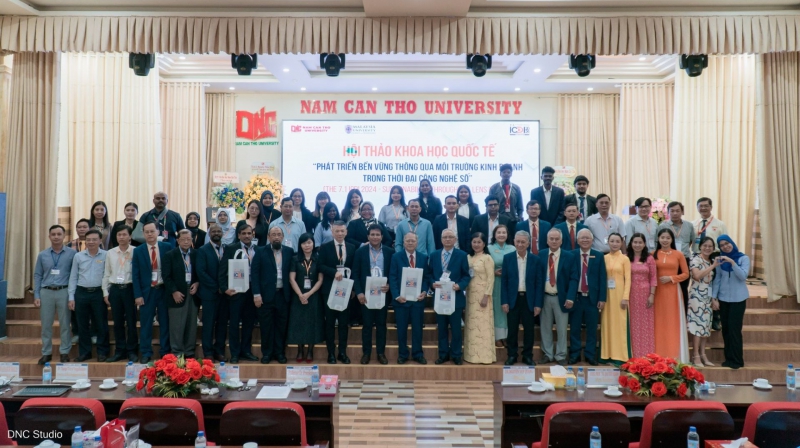
NCTU - To seek breakthrough solutions, turn challenges into opportunities, and build a more sustainable future for businesses in the era of digital transformation, Nam Can Tho University (NCTU) held the International Scientific Conference titled "Sustainable Development through the Business Environment in the Digital Technology Era."
Accordingly, the conference attracted the participation of over 200 delegates, including scientists, researchers, business leaders, and experts in the field of sustainable development, on November 8, 2024.
Speaking at the conference, Dr. Nguyen Van Quang, Rector of NCTU, stated that in the context of digital technology profoundly changing the way businesses operate, sustainable development has become one of the greatest challenges and opportunities today. Therefore, adapting to digital transformation helps businesses optimize production processes, reduce costs, and enhance competitiveness through automation, data analysis, and effective information management. This, in turn, creates a sustainable development model, contributing to economic growth within a healthy business environment.

Regarding the improvement of the business environment and sustainable development, Assoc. Prof. Dr. Premkumar Rajagopal, Rector of the Malaysia University of Science and Technology, emphasized the need for close collaboration between policymakers, scientists, businesses, and those involved in research and education to collectively devise solutions to turn challenges into opportunities in the current digitalization phase. Additionally, digital transformation ensures that businesses can fully leverage existing databases to create a modern working environment and foster better connections with training institutions, helping students easily access information, gain practical experience, and integrate into the job market after graduation.
Speaker from the Malaysia University of Science and Technology at the Conference
At the conference, several experts presented research on how technology can drive sustainable development initiatives, from efficient resource management to improving supply chains. Additionally, delegates discussed and focused on evaluating the role of "environmental, social, and governance" (ESG) factors in modern business strategies and how businesses can integrate ESG to enhance value and mitigate risks.
The issue of sustainable supply chain and logistics management was highlighted by many experts as one of the key factors ensuring the efficient and environmentally friendly flow of products from suppliers to consumers. This is considered a critical element in helping businesses optimize operations while achieving sustainable development goals.